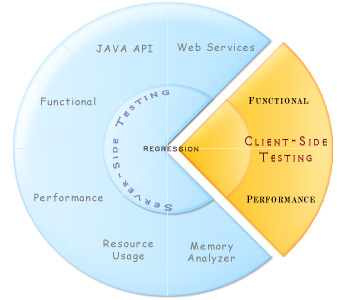The soul of the mac... on your PC?

"More than even the processor... more than even the hardware innovations that we bring to the market... the soul of the Mac is its operating system... and we're not standing still!"
-Steve Jobs, closing his keynote at WWDC 2005
I wonder if that means Apple's going to release Mac OS "leopard" for PCs also...
That would definitely be inline with the Mac Mini release. They admit they have been running secret projects for years. And all they really still need is a specific hardware abstraction layer as well as a few drivers... Definitely possible...
Testing web applications

Note to myself: unit testing is a great thing and I should do it more, I plan to do it more. But, unit testing is not enough...
What we need for web applications (or complex dynamic web sites if you prefer) would be something like this: the TEST program would act like a regular web browser, executing javascript and all the rest. The main difference with a web browser would be that the TEST program would be scriptable.
You could script it to log in, enter data into forms, perform search requests, check that the requested data appears on the screen, etc... You may even want to compare the generated HTML with a prerecorded excerpt. You may want to tolerate differences like white spaces and may be even non structural tags (ignore spans, styles attributes, etc...)
Of course, you'll want the TEST program to validate the XHTML output as well as the CSS styles.
Advanced testing would involve sending onclic events to specific objects on the page and see how the javascript behaves.
You'd have different scenarios you could run in sequence to fully test your application.
Even better: you could run multiple scenarios concurently (you'll need cookie isolated client threads for this) in order to stress load your application and record response times.
God, I gotta stop dreaming about it and find that gem...
Later:
I found a few potentially interesting tools here:
- Puffin Automation Framework. Open Source. [No longer exists]
- QEngine WebTest. Free / Commercial. [No longer exists]
- WAPT Web Application Testing. $ 250.
- WebKing. Commercial.
- OpenLoad. Commercial. [No longer exists]
- Web Performance Load Tester. 499 € +.
- iMacros. $30 - $499.
- eValid [No longer exists]
Mucho later:
Hungarian notation on steroids: semantic types & suffixes
Joel on Software’s latest bewildering article advocates correct use of the – often misunderstood – Hungarian notation: “Making Wrong Code Look Wrong“.
Basically, calling a variable unBorder because it’s an unsigned int is pointless. What’s useful is to call it xwBorder because it’s an horinzontal “x” coordinate (versus a bytecount for example) that refers to the window “w” (versus the screen or the document for example). If this doesn’t feel a 100 times better to you, go read the article now! :)
I really agree with the fact that knowning the system type of a variable when you read it is pretty much useless most of the time – especially in the age of typeless scripting languages like PHP. Knowing the semantic type of the variable is much more interesting.
As I have written before in my coding standard guidelines, there’s a situation, though, where I still like to use system types in my variable names: when I deal with Objects. For example I might use variable names like source_File and destination_File!
First, because if the Objects are properly named, then the variable names refering to them will make sense.
But there’s more: as you might have noticed, I used the object name “File” as a suffix, not as a Hungarian prefix. The reason is that if I have a method called File::rename() that I want to refactor for some reason (like merge it with File::move() ), I might need to check every place where it’s called. Actually, as I have learned from b2evolution development, these things happen all the time on larger projects…
Now, by suffixing vars with the object name, I can easily do a project wide search for File->rename( and I’ll find all calls to the method, in various contexts such as source_File>rename(), destination_File->rename(), temp_File->rename(), log_File->rename() … you get the idea…
If I have one variable misnamed as in list->rename() for example, I would not find it… unless I decide to search on just ->rename(… but I wouldn’t want that! It would get me a lot of noise like: some_Collection->rename(), some_User->rename(), some_Group->rename(), etc…
PHP Variable names, Member names, Class names
I have just extended my PHP coding standard guidelines with these rules about variable naming:
Remember this is PHP, not Microsoft Visual C++. There is actually little value in naming variables something like strFullTitle . Something like full_title is definitely enough and much easier to read!
- As an exception to the previous rule, we'll preferably prefix private or protected member variables of a class with an underscore as in _full_title. This serves as an easy reminder that the variable is not designed to be called in any other ways as in $this->_full_title .
- Class names should start with a capital, as in Book .
Variable names should be all lowercase, as in $title = 'A brand new day'; except when they are object references as in:
$a_Book = & new Book( 'A brand new day' );When naming object references, always end their name with the name of the class as in $a_Book or $another_Book instead of
Book_to_readfor example. This allows to easily search & find all calls to a given method of a given class. You could for exampel easily search on this string: "Book->get_title(" .
IM sucks... (and so does email)
Over the last 6 months I have refrained as much as possible from using Instant Messaging, if it was not for scheduled conversations. I mean, IM is cool in a "netmeeting" kind of way. But having an IRC/MSN/Yahoo/ICQ/Whatever Messenger open all day, poping up alerts every 10 to 20 minutes, is definitely a major disturbance!
I got into arguments about this with friends. They were arguing that "you don't have to answer if you don't want to" and I was arguing that "you cannot focus on what you're constantly evaluating whether or not you're gonna reply to the latest interruption".
It's been hard to come to an agreement... but now... I have scientific evidence to back up my position! :>> You think you're too smart to be subject to attention disorder? Check those out:
Those actually articles talk about email, but email is only the ancient, slow, lightweight form of the Instant Messaging disturbance! ;)
I do actually tend to close my email client as well when I need concentration. I try to only open it every 2 to 3 hours or so. And even if I leave it open: I have turned of new mail alerts and sounds! You oughta try that someday ;) You wouldn't believe how much better you'll be able to focus!
Now, I still need to deal with that pesky phone which always rings at a bad time... and maybe I'll eventually get my work environment optimized for efficiency!
